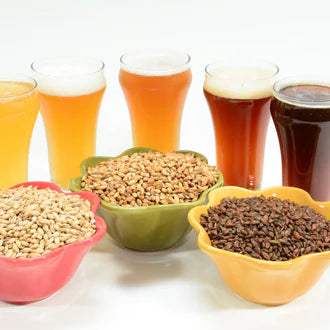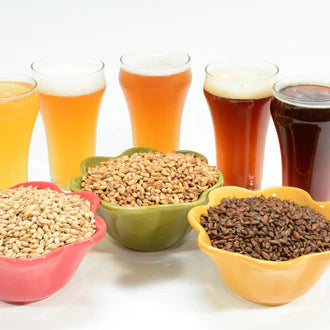Black Malt (also called Black Patent Malt) is a highly roasted malt used in brewing, primarily to impart deep color and roasted flavors to beer. It’s one of the darkest malts available and has a significant impact on the beer's sensory characteristics, especially in dark styles. Here's an overview of its key properties:
Characteristics of Black Malt in Beer
-
Color Contribution:
- Black malt contributes very dark brown to black color to the beer, with an EBC (European Brewery Convention) range of 1200–1500 or more. It’s often used in small quantities to create deep, rich hues typical of porters, stouts, and other dark beers.
- Even small amounts can significantly darken the beer, so it's usually used sparingly.
-
Flavor Profile:
- Roasted, Coffee-Like: Black malt imparts strong roasted flavors, often reminiscent of burnt toast, coffee, or espresso. These intense flavors can provide complexity and bitterness, but if used in excess, they can be harsh or astringent.
- Char, Ash, and Smoky Notes: The malt’s deep roast profile can add charred, ashy, or slightly smoky characteristics to the beer.
- Dry and Bitter Finish: Black malt typically provides a dry finish with a notable bitterness that balances sweetness from other malts, especially in higher gravity beers.
-
Astringency:
- The dark roasting process can introduce some astringency, especially if overused. This astringency can be perceived as a dry, bitter edge in the beer, which needs to be balanced with sweetness from other malts or ingredients.
-
Low Fermentable Sugars:
- Because black malt is highly roasted, it contributes minimal fermentable sugars to the wort. Its primary role is to add color and flavor, not to increase alcohol content or body.
-
Minimal Aroma Contribution:
- While it provides strong roasted flavors, the aroma is generally subdued compared to other specialty malts like Chocolate Malt. The aroma it imparts tends to align with its flavor: hints of coffee, ash, or burnt toast.
-
Acidity:
- Black malt can slightly lower the pH of the mash, creating a more acidic environment, which can contribute to the overall flavor profile by adding a touch of sharpness and helping to balance sweetness in certain beer styles.
Beer Styles That Use Black Malt
- Porters: Traditional English and American porters often include black malt to provide roasted, coffee-like flavors and a deep brown to black color.
- Stouts: Various types of stouts, including dry stouts (like Irish stout) and imperial stouts, use black malt for its intense roasted characteristics, which complement the beer’s rich, full-bodied profile.
- Schwarzbier: This dark German lager sometimes uses small amounts of black malt to achieve its dark color and mild roast flavor.
- Cascadian Dark Ales (Black IPAs): Black malt can be used to give these hop-forward beers a dark color and subtle roast without overpowering the hop character.
Usage in Brewing
- Quantity: Black malt is typically used in small amounts, usually around 1-5% of the grain bill, due to its strong impact on color and flavor. Higher amounts can lead to excessive bitterness and harsh flavors.
- Timing: Some brewers choose to add black malt late in the mash to minimize astringency while still achieving the desired color.
In summary, black malt is an intensely roasted malt that adds dark color, strong roasted flavors, and bitterness to beer. It’s a key ingredient in stouts, porters, and other dark styles, but its powerful characteristics mean it should be used carefully to avoid overwhelming the beer with bitterness or astringency.


